Module 4 Life in the future知识点讲解课件2021-2022学年外研七年级下册英语
文档属性
| 名称 | Module 4 Life in the future知识点讲解课件2021-2022学年外研七年级下册英语 | 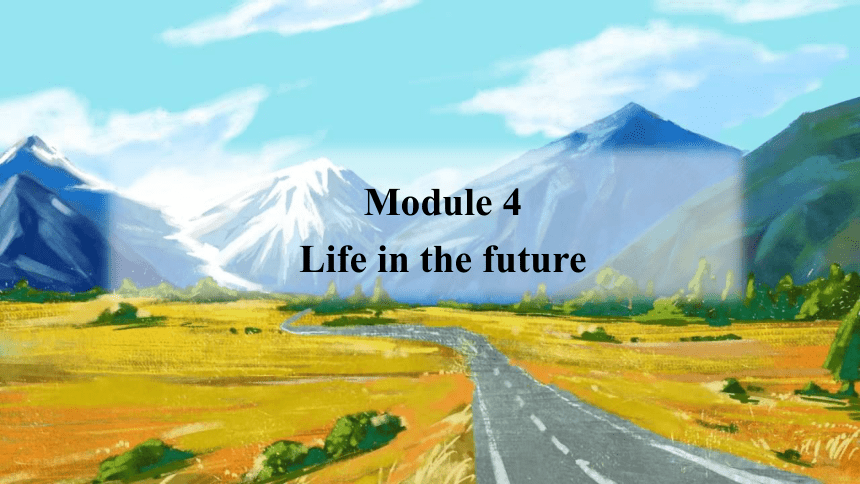 | |
| 格式 | pptx | ||
| 文件大小 | 362.4KB | ||
| 资源类型 | 教案 | ||
| 版本资源 | 外研版 | ||
| 科目 | 英语 | ||
| 更新时间 | 2022-01-08 20:45:54 | ||
图片预览

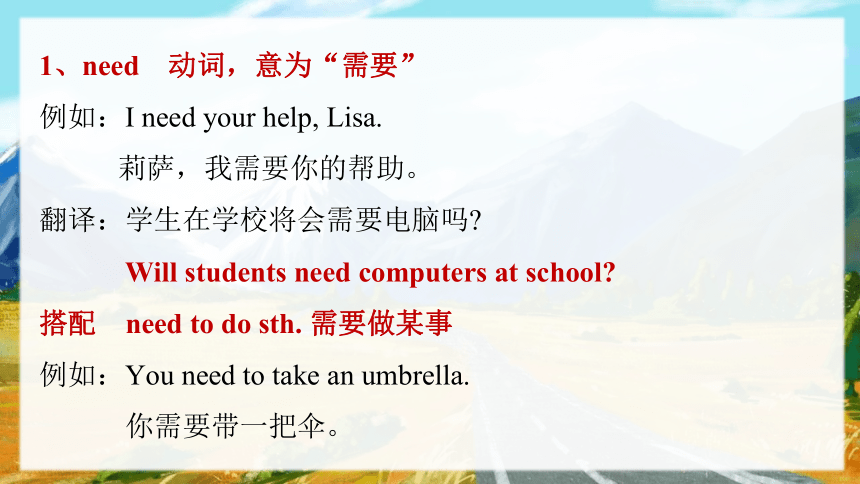
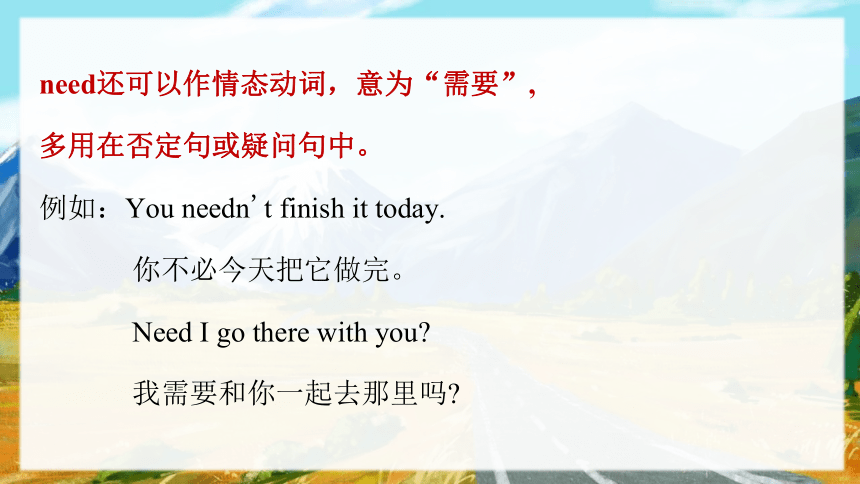
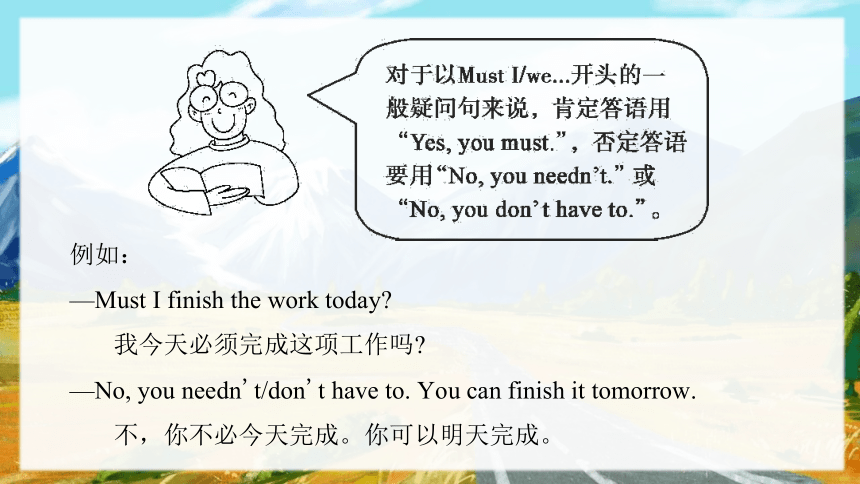
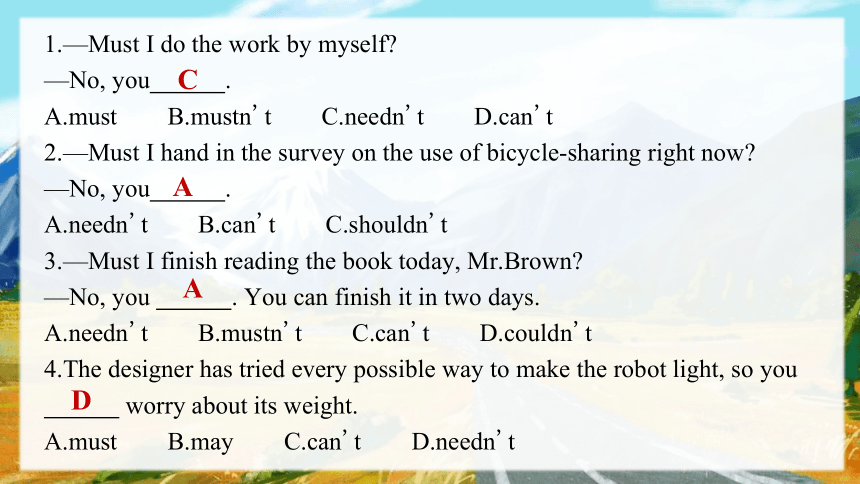
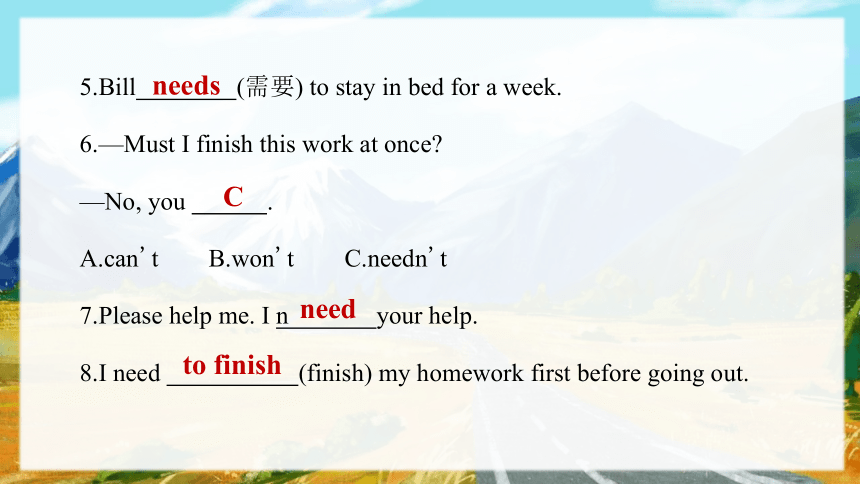
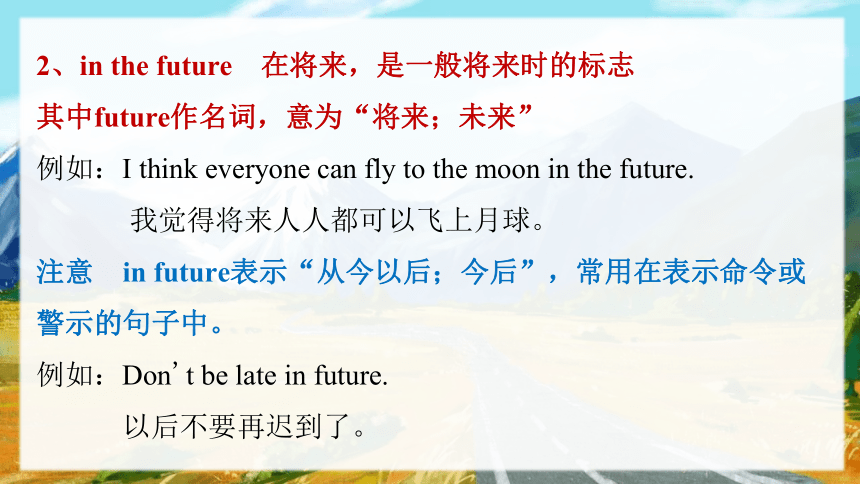
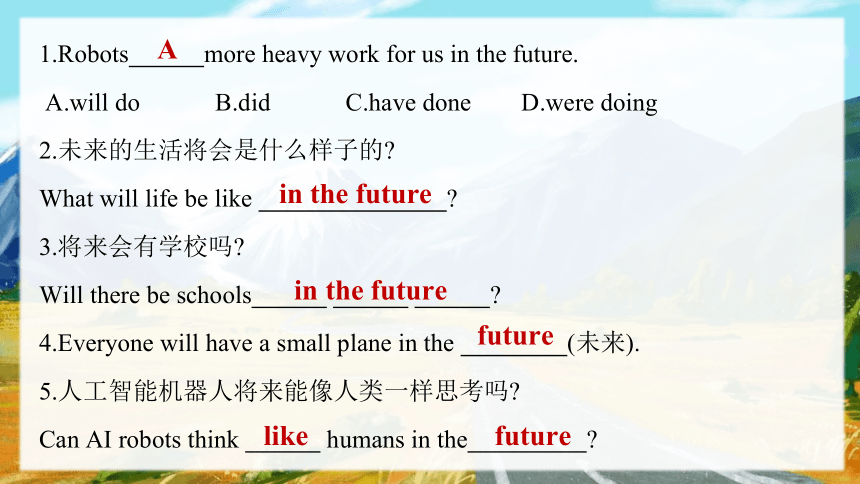
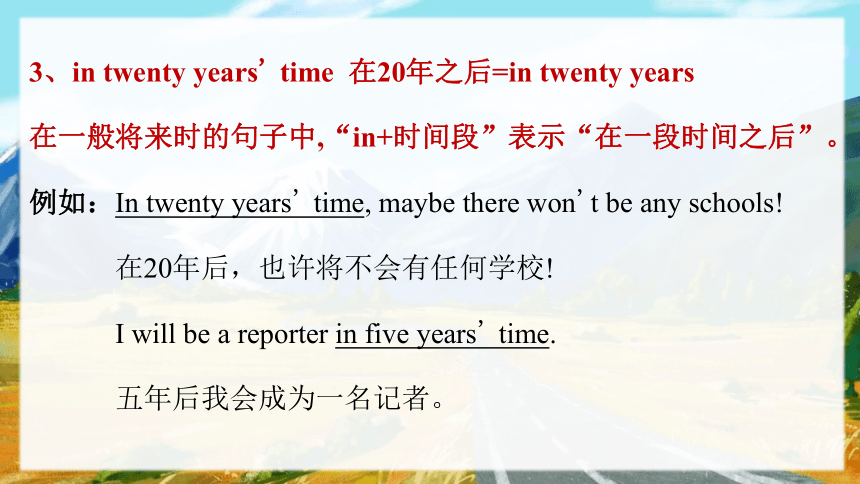
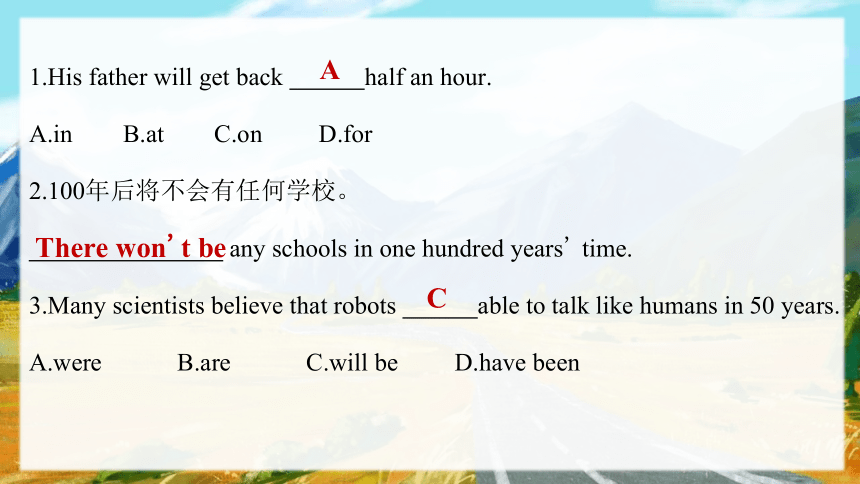
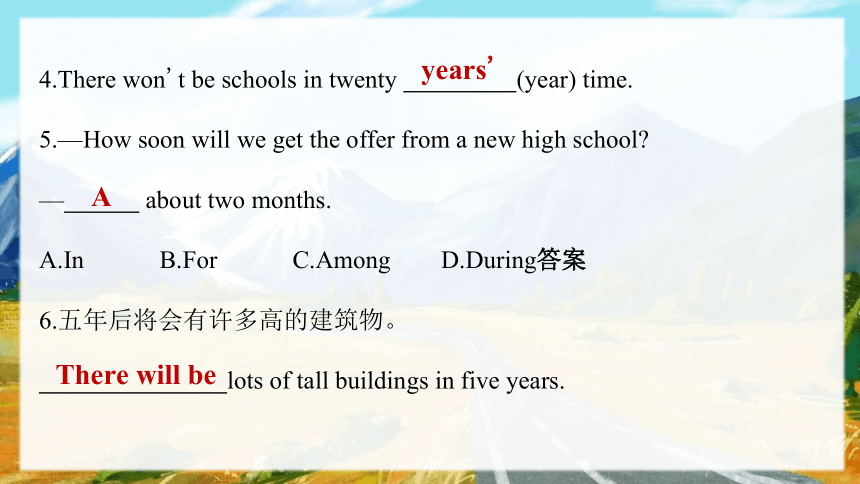
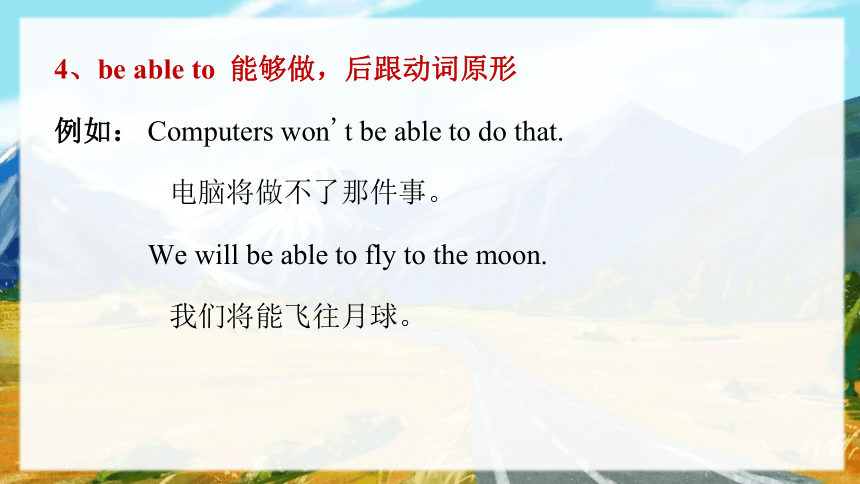
文档简介
(共60张PPT)
Module 4
Life in the future
1、need 动词,意为“需要”
例如:I need your help, Lisa.
莉萨,我需要你的帮助。
翻译:学生在学校将会需要电脑吗
Will students need computers at school
搭配 need to do sth. 需要做某事
例如:You need to take an umbrella.
你需要带一把伞。
need还可以作情态动词,意为“需要”,
多用在否定句或疑问句中。
例如:You needn't finish it today.
你不必今天把它做完。
Need I go there with you
我需要和你一起去那里吗
例如:
—Must I finish the work today
我今天必须完成这项工作吗
—No, you needn't/don't have to. You can finish it tomorrow.
不,你不必今天完成。你可以明天完成。
1.—Must I do the work by myself
—No, you .
A.must B.mustn't C.needn't D.can't
2.—Must I hand in the survey on the use of bicycle-sharing right now
—No, you .
A.needn't B.can't C.shouldn't
3.—Must I finish reading the book today, Mr.Brown
—No, you . You can finish it in two days.
A.needn't B.mustn't C.can't D.couldn't
4.The designer has tried every possible way to make the robot light, so you worry about its weight.
A.must B.may C.can't D.needn't
C
A
A
D
5.Bill (需要) to stay in bed for a week.
6.—Must I finish this work at once
—No, you .
A.can't B.won't C.needn't
7.Please help me. I n your help.
8.I need (finish) my homework first before going out.
C
needs
need
to finish
2、in the future 在将来,是一般将来时的标志
其中future作名词,意为“将来;未来”
例如:I think everyone can fly to the moon in the future.
我觉得将来人人都可以飞上月球。
注意 in future表示“从今以后;今后”,常用在表示命令或警示的句子中。
例如:Don't be late in future.
以后不要再迟到了。
1.Robots more heavy work for us in the future.
A.will do B.did C.have done D.were doing
2.未来的生活将会是什么样子的
What will life be like
3.将来会有学校吗
Will there be schools
4.Everyone will have a small plane in the (未来).
5.人工智能机器人将来能像人类一样思考吗
Can AI robots think humans in the
A
in the future
in the future
future
like future
3、in twenty years' time 在20年之后=in twenty years
在一般将来时的句子中,“in+时间段”表示“在一段时间之后”。
例如:In twenty years' time, maybe there won't be any schools!
在20年后,也许将不会有任何学校!
I will be a reporter in five years' time.
五年后我会成为一名记者。
1.His father will get back half an hour.
A.in B.at C.on D.for
2.100年后将不会有任何学校。
any schools in one hundred years' time.
3.Many scientists believe that robots able to talk like humans in 50 years.
A.were B.are C.will be D.have been
A
C
There won't be
4.There won't be schools in twenty (year) time.
5.—How soon will we get the offer from a new high school
— about two months.
A.In B.For C.Among D.During答案
6.五年后将会有许多高的建筑物。
lots of tall buildings in five years.
years'
A
There will be
4、be able to 能够做,后跟动词原形
例如: Computers won't be able to do that.
电脑将做不了那件事。
We will be able to fly to the moon.
我们将能飞往月球。
be able to和can都表示能力,有时可互换,但也有所区别:
can 用于一般现在时和一般过去时,过去式为could。
没有人称和数的变化
be able to 可用于各种时态
例如:She has been able to dress herself.
她已经可以自己穿衣服了。
1.My sister says that she can finish her project by herself. (同义句转换)
My sister says that she finish her project by herself.
2.Trust me. I am a to solve the problem by myself.
3.Computers won't be able (check) the students' level.
is able to
able
to check
4.In the future, the robots will help us do many things, such as washing
and cooking.
A.be good at B.get ready for
C.be able to D.look forward to
5.你能完成那项工作吗
Are you the work
6.我能独立完成那项工作。
I am able to finish the work by myself.
C
able to finish
5、come true 实现,其主语是物
例句:Which ones will come true
哪一些会成为现实呢
I hope your dream can come true.
我希望你的梦想能够实现。
come短语
come on 加油;快点
come back 回来
come in 进来
come out 出版
come round 拜访某人的家
1.It's the old man's dream to go to Beijing. Can his dream
A.go out B.eat out
C.come true D.come on
2.Work hard, and your dream will come t .
3.My sister wants to be a doctor. She hopes her dream can .
A.cut down B.come true C.put up D.run away
4.村民们的梦想能实现吗
Can the villagers' dream
C
B
true
come true
5.我一直相信你的梦想能实现的。
I always believe your dream can .
6.我希望你的梦想能实现。
I hope your dream can .
7.坚持你的梦想,将来有一天,它可能会实现。
on to your dream;one day it may come .
come true
come true
Hold true
6、cheap 形容词,意为“便宜的”,反义词是expensive。
例如:No more expensive cars—it'll be cheap to travel everywhere by
plane, not only over land, but also over the sea or even into space.
不再有昂贵的汽车,乘飞机到处旅行将变得便宜,不仅可以越过陆地,还可以越过大海或者甚至进入太空。
She often buys some expensive clothes.
她经常买一些昂贵的衣服。
I will buy the cheaper one.
我会买那个比较便宜的。
注意:
物品本身做主语,要用cheap、expensive修饰;
物品的价格做主语,要用low、high修饰。
1.—The watch is too expensive.
—Well, I have got some ones. They are over there.
A.heavy B.light C.cheap D.small
2.This coat is very (便宜的), only 120 yuan.
3.—I know you like the mobile phone. Are you going to buy it
—No, I'm not. It's too for me. I can't afford it.
A.high B.low C.expensive D.cheap
4.—This camera is too expensive. Do you have any others
—Sorry, but that's the one.
A.biggest B.longest C.cheapest
C
C
C
cheap
5.The car is expensive for me. I will buy a c one because I don't have enough money.
6.—Why don't you buy the sweater
—It's too , and I don't have enough money to buy it.
A.nice B.expensive C.popular D.cheap
7.These shoes are very (便宜的). They only cost 20 yuan.
cheap
B
cheap
7、not only...but also 不仅……而且……,
用于连接两个并列的成分。
例如:No more expensive cars—it'll be cheap to travel everywhere by plane, not only over land, but also over the sea or even into space.
不再有昂贵的汽车,乘飞机到处旅行将变得便宜,不仅可以越过陆地,还可以越过大海或者甚至进入太空。
She is not only clever, but also beautiful.
她不仅聪明,而且漂亮。
例如:
Not only the twins but also he likes swimming.
不仅那对双胞胎,而且他也喜欢游泳。
注意
总结
动词只能用复数形式:both ... and ...
就近原则:
there be句型
either ... or ...
neither ... nor ...
not only ... but also
就远原则:with、as well as等
1. Jane Peter is warm-hearted. They're popular with our class.
A.Both;and B.Not only;but also C.Neither;nor
2.WeChat (微信) is widely used. the young the old are
interested in it.
A.Either;or B.Neither;nor C.Not only;but also
3.Not only she but also I going to the party.
A.is B.are C.be D.am
B
C
D
4.Not only you but also I interested in the cartoon called Peppa Pig.
A.am B.is C.are
5.史蒂芬·霍金不仅是一名伟大的物理家,而且是一位著名的数学家。
Stephen Hawking was a great physicist
a famous mathematician.
6.Not only Jack but also I crazy about the football match.
A.am B.is C.are D.be
A
A
not only but also
7.Not only I but also my brother good at cooking.
A.be B.is C.am D.are
8. Anna her brother like listening to soft music.
A.Both;and B.Neither;nor
C.Either;or D.Not only;but also
9.—How do you like the two pairs of shoes
—They don't fit me. They are too big too small.
A.not only...but also... B.neither...nor... C.either...or...
B
A
C
8、heavy 形容词,意为“繁重的;沉的”,
反义词是light“轻的”。
例如: Well, you're going to like the future because machines and robots will do all the heavy and difficult jobs, and we'll only do light and easy work.
那么,你会喜欢未来的,因为机器和机器人将会做所有繁重而又困难的工作,而我们只需要做轻松而简单的工作。
Which is heavier, an elephant or a horse 大象和马哪个更重
heavy还有“很多的;大量的;程度大的”之意,
如heavy rain意为“大雨”。表示“雨下得大”时,要用副词 heavily来修饰动词rain。
1.In summer, it often rains (heavy) with strong wind in Southern China.
2.—There was a snow last night. We should clean the snow this morning.
—No, we should go and make a snowman.
A.heavy B.strong C.beautiful D.thin
3.The big box is full of old books. I can't carry it because it is very h
for me.
4.The rain will be very . It will rain this afternoon.
A.heavy;heavy B.heavily;heavily C.heavily;heav D.heavy;heavily
heavily
heavy
A
D
5—What's the weather like in summer here
—It's hot. Sometimes it rains .
A.clearly B.heavily C.carefully
6.The box is too h for me to carry. It's not light at all.
7.We can collect rainwater when it rains , and use it to water plants.
A.softly B.heavily C.noisily D.quietly
8.It rains (heavy)outside now. So we won't go out today.
B
B
heavy
heavily
9、easy 形容词,意为“容易的”;
反义词:hard/difficult adj.困难的
easily adv.容易地
例如:Everybody can do it because it's easy.
每个人都会做这件事,因为它简单。
1.This physics problem is . I can't work it out .
A.easy;easily B.difficult;easily C.easy;hard
2.Don't worry!You can get to the park (easy).
3.The question is . I can answer it .
A.easy;easily B.easy;easy
C.easily;easy D.easily;easily
B
A
easily
辨析:take, bring, carry, fetch
take 表示“带走”,从说话人处带到别处
bring 表示“带来”,从别处带到说话人处
carry 表示“携带;拿;搬”,只表示负重,不强调方向
fetch 表示“取来”,描述的是一个双向的动作
例句:
She will take me to the zoo.她会带我去动物园。
Red can bring us good luck.红色能够带给我们好运。
I can't carry it.我搬不动它。
Can you fetch me a box of chalk 你能给我取一盒粉笔吗
1.Please these things to your brother. He is working in the garden.
A.take B.carry C.bring D.get
2.The box is too heavy. I can't c it. Please help me, Mike.
A
carry
一般将来时:will
除了be going to之外,will也可以构成一般将来时。
will后跟动词原形,而且它不会随主语的变化而发生变化。
例如:We will move to London next year.
明年我们会搬到伦敦去住。
She will go to the party with her friends.
她会和她的朋友们一起去参加聚会。
肯定句 主语+will+动词原形+其他.
否定句 主语+will not/won't+动词原形+其他.
一般疑问句 Will+主语+动词原形+其他
肯定回答 Yes, 主语+will.
否定回答 No, 主语+won't.
特殊疑问句 特殊疑问词+will+主语+动词原形
(1)will结构的一般将来时的句式变化
例句:
He will buy the red car.他会买那辆红色的汽车。
He won't buy the red car.他不会买那辆红色的汽车。
—Will he buy the red car 他会买那辆红色的汽车吗
—Yes, he will.是的,他会。
—No, he won't.不,他不会。
(2)there be结构的一般将来时的句式变化
肯定句 There will be+主语+其他.
否定句 There will not/won't be+主语+其他.
一般疑问句 Will there be+主语+其他
肯定答语 Yes, there will.
否定答语 No, there won't.
例句:
There will be more trees in the future.
将来会有更多的树。
There won't be more trees in the future.
将来不会有更多的树。
—Will there be more trees in the future 将来会有更多的树吗
—Yes, there will.是的,会有。
—No, there won't.不,不会有。
1.—What will you do after school
—I football with my classmates.
A.play B.played C.am playing D.will play
2.There a sports meeting tomorrow afternoon.
A.is going to have B.is
C.is going to be D.will have
3.There is a basketball match today. (把today改为tomorrow)
There a basketball match tomorrow.
D
C
will be
4.There will be more private cars in the future. (改为否定句)
more private cars in the future.
5.There will be robots in our homes. (改为一般疑问句,并作否定回答)
— robots in our homes
—No, .
6.We will stay at home and watch TV. (改为否定句)
We at home and watch TV.
There won't be
Will there be
there won't
won't stay
7.There will be some interesting activities in the camp.
(改为一般疑问句,并作肯定回答)
— interesting activities in the camp
—Yes, .
8.你们的新教室将会是什么样的
What will your new classroom
9.人们将会有更多的空闲时间。
People free time.
Will there be any
there will
be like
will have more
10.你会怎样学英语
you learn English
11.My sister will stay at home tomorrow. (改为否定句)
My sister at home tomorrow.
12.People will use robots more and more in the future life.(改为一般疑问句)
people robots more and more in the future life
How will
won't stay
Will use
13.There will be traffic jams in the air. (改为否定句)
There traffic jams in the air.
14.There will be a lot of robots to help us with the heavy work in the future.
(改为一般疑问句)
there a lot of robots to help us with the heavy work in the future
15.He often goes hiking at the weekend.(用next Sunday 改写句子)
He next Sunday.
won't be
Will be
will go hiking
16.It will rain in a few minutes. (改为一般疑问句)
17.我将会有许多家庭作业要做。
I will have a lot of homework to do.
18.老师们将不再需要粉笔了。
Teachers won't need chalk any more.
Will it rain in a few minutes
19.将来学校将会不一样吗
Will schools be different in the future
20.我们将会有更多的空闲时间。
We will have more free time.
21.十年后将不会有太多汽车。
There won't be too many cars in ten years.
22.She (stay) at home this afternoon. She won't go out.
23.There a nice film this evening.
A.is going to be B.are going to have C.are going to be D.will have
24.Next week, each student in the class a small gift from their teachers.
A.receives B.received C.will receive D.has received
will stay
A
C
25.学生将会在互联网上获得许多信息。
Students lots of information .
26.I think there will a computer in every home.
A.have B.is C.be D.has答案
27.将来我会有一个机器人。
I a robot .
will get on the Internet
C
will have in the future
28.你会和我们一起去看电影吗
you a movie with us
29.There a basketball match in our school this afternoon.
A.will have B.will be C.is going to have
30.—Will there be paper in school in 100 years
— .
A.Yes, it will B.No, there won't
C.No, there will D.Yes, there won't
Will see
B
B
31.We a party for Kate. It's supposed to be a surprise.
A.were having B.had C.will have D.have had
32.人们将会乘坐宇宙飞船飞到火星去吗
people the spaceship to Mars
33.Michael in a school in Yunnan from February to June next year.
A.teach B.taught C.will teach D.was teaching
C
Will take
C
34.There a folk music concert in Xinjiang Opera Theater next month.
A.is going to have B.will have
C.is D.is going to be
35.—Your father has gone to Shenzhen on business, hasn't he
—Yes. And he in two weeks.
A.will return B.has returned C.returned D.returns
36.—Will students go to school in the future, Mr. Li
— . I think they'll study at home.
A.Yes, they are B.No, they won't C.Yes, they will D.No, they aren't
D
A
B
37.There great changes in our lives in ten years' time.
A.is B.will have C.will be
38.—Will your parents have a picnic with you next Sunday
— . They will be busy that day.
A.Yes, they will B.No, they won't
C.Yes, they do D.No, they don't
39.Jim will watch the ballet tomorrow evening.(改为一般疑问句)
Jim the ballet tomorrow evening
C
B
Will watch
40.We clean our classroom every day.(用tomorrow改写句子)
We our classroom tomorrow.
41.We'll have a meeting next Monday.(改为否定句)
We a meeting next Monday.
42.They will do some shopping this Sunday.(对画线部分提问)
they this Sunday
will clean
won't have
What will do
43.There will be a concert at the weekend. (改为否定句)
There a concert at the weekend.
44.Will there be a football match tomorrow (作肯定回答)
Yes, .
45.我觉得五年后我会成为一名记者。
I think I a reporter .
won't be
there will
will be in five years
46.未来会有更多的机器人吗
be more robots in the future
47.—Will there be schools in the future
—No, there .
A.won't be B.won't C.will be not
48.I think he in America next year.
A.study B.studies C.is studying D.will study
Will there
B
D
Thank you
Module 4
Life in the future
1、need 动词,意为“需要”
例如:I need your help, Lisa.
莉萨,我需要你的帮助。
翻译:学生在学校将会需要电脑吗
Will students need computers at school
搭配 need to do sth. 需要做某事
例如:You need to take an umbrella.
你需要带一把伞。
need还可以作情态动词,意为“需要”,
多用在否定句或疑问句中。
例如:You needn't finish it today.
你不必今天把它做完。
Need I go there with you
我需要和你一起去那里吗
例如:
—Must I finish the work today
我今天必须完成这项工作吗
—No, you needn't/don't have to. You can finish it tomorrow.
不,你不必今天完成。你可以明天完成。
1.—Must I do the work by myself
—No, you .
A.must B.mustn't C.needn't D.can't
2.—Must I hand in the survey on the use of bicycle-sharing right now
—No, you .
A.needn't B.can't C.shouldn't
3.—Must I finish reading the book today, Mr.Brown
—No, you . You can finish it in two days.
A.needn't B.mustn't C.can't D.couldn't
4.The designer has tried every possible way to make the robot light, so you worry about its weight.
A.must B.may C.can't D.needn't
C
A
A
D
5.Bill (需要) to stay in bed for a week.
6.—Must I finish this work at once
—No, you .
A.can't B.won't C.needn't
7.Please help me. I n your help.
8.I need (finish) my homework first before going out.
C
needs
need
to finish
2、in the future 在将来,是一般将来时的标志
其中future作名词,意为“将来;未来”
例如:I think everyone can fly to the moon in the future.
我觉得将来人人都可以飞上月球。
注意 in future表示“从今以后;今后”,常用在表示命令或警示的句子中。
例如:Don't be late in future.
以后不要再迟到了。
1.Robots more heavy work for us in the future.
A.will do B.did C.have done D.were doing
2.未来的生活将会是什么样子的
What will life be like
3.将来会有学校吗
Will there be schools
4.Everyone will have a small plane in the (未来).
5.人工智能机器人将来能像人类一样思考吗
Can AI robots think humans in the
A
in the future
in the future
future
like future
3、in twenty years' time 在20年之后=in twenty years
在一般将来时的句子中,“in+时间段”表示“在一段时间之后”。
例如:In twenty years' time, maybe there won't be any schools!
在20年后,也许将不会有任何学校!
I will be a reporter in five years' time.
五年后我会成为一名记者。
1.His father will get back half an hour.
A.in B.at C.on D.for
2.100年后将不会有任何学校。
any schools in one hundred years' time.
3.Many scientists believe that robots able to talk like humans in 50 years.
A.were B.are C.will be D.have been
A
C
There won't be
4.There won't be schools in twenty (year) time.
5.—How soon will we get the offer from a new high school
— about two months.
A.In B.For C.Among D.During答案
6.五年后将会有许多高的建筑物。
lots of tall buildings in five years.
years'
A
There will be
4、be able to 能够做,后跟动词原形
例如: Computers won't be able to do that.
电脑将做不了那件事。
We will be able to fly to the moon.
我们将能飞往月球。
be able to和can都表示能力,有时可互换,但也有所区别:
can 用于一般现在时和一般过去时,过去式为could。
没有人称和数的变化
be able to 可用于各种时态
例如:She has been able to dress herself.
她已经可以自己穿衣服了。
1.My sister says that she can finish her project by herself. (同义句转换)
My sister says that she finish her project by herself.
2.Trust me. I am a to solve the problem by myself.
3.Computers won't be able (check) the students' level.
is able to
able
to check
4.In the future, the robots will help us do many things, such as washing
and cooking.
A.be good at B.get ready for
C.be able to D.look forward to
5.你能完成那项工作吗
Are you the work
6.我能独立完成那项工作。
I am able to finish the work by myself.
C
able to finish
5、come true 实现,其主语是物
例句:Which ones will come true
哪一些会成为现实呢
I hope your dream can come true.
我希望你的梦想能够实现。
come短语
come on 加油;快点
come back 回来
come in 进来
come out 出版
come round 拜访某人的家
1.It's the old man's dream to go to Beijing. Can his dream
A.go out B.eat out
C.come true D.come on
2.Work hard, and your dream will come t .
3.My sister wants to be a doctor. She hopes her dream can .
A.cut down B.come true C.put up D.run away
4.村民们的梦想能实现吗
Can the villagers' dream
C
B
true
come true
5.我一直相信你的梦想能实现的。
I always believe your dream can .
6.我希望你的梦想能实现。
I hope your dream can .
7.坚持你的梦想,将来有一天,它可能会实现。
on to your dream;one day it may come .
come true
come true
Hold true
6、cheap 形容词,意为“便宜的”,反义词是expensive。
例如:No more expensive cars—it'll be cheap to travel everywhere by
plane, not only over land, but also over the sea or even into space.
不再有昂贵的汽车,乘飞机到处旅行将变得便宜,不仅可以越过陆地,还可以越过大海或者甚至进入太空。
She often buys some expensive clothes.
她经常买一些昂贵的衣服。
I will buy the cheaper one.
我会买那个比较便宜的。
注意:
物品本身做主语,要用cheap、expensive修饰;
物品的价格做主语,要用low、high修饰。
1.—The watch is too expensive.
—Well, I have got some ones. They are over there.
A.heavy B.light C.cheap D.small
2.This coat is very (便宜的), only 120 yuan.
3.—I know you like the mobile phone. Are you going to buy it
—No, I'm not. It's too for me. I can't afford it.
A.high B.low C.expensive D.cheap
4.—This camera is too expensive. Do you have any others
—Sorry, but that's the one.
A.biggest B.longest C.cheapest
C
C
C
cheap
5.The car is expensive for me. I will buy a c one because I don't have enough money.
6.—Why don't you buy the sweater
—It's too , and I don't have enough money to buy it.
A.nice B.expensive C.popular D.cheap
7.These shoes are very (便宜的). They only cost 20 yuan.
cheap
B
cheap
7、not only...but also 不仅……而且……,
用于连接两个并列的成分。
例如:No more expensive cars—it'll be cheap to travel everywhere by plane, not only over land, but also over the sea or even into space.
不再有昂贵的汽车,乘飞机到处旅行将变得便宜,不仅可以越过陆地,还可以越过大海或者甚至进入太空。
She is not only clever, but also beautiful.
她不仅聪明,而且漂亮。
例如:
Not only the twins but also he likes swimming.
不仅那对双胞胎,而且他也喜欢游泳。
注意
总结
动词只能用复数形式:both ... and ...
就近原则:
there be句型
either ... or ...
neither ... nor ...
not only ... but also
就远原则:with、as well as等
1. Jane Peter is warm-hearted. They're popular with our class.
A.Both;and B.Not only;but also C.Neither;nor
2.WeChat (微信) is widely used. the young the old are
interested in it.
A.Either;or B.Neither;nor C.Not only;but also
3.Not only she but also I going to the party.
A.is B.are C.be D.am
B
C
D
4.Not only you but also I interested in the cartoon called Peppa Pig.
A.am B.is C.are
5.史蒂芬·霍金不仅是一名伟大的物理家,而且是一位著名的数学家。
Stephen Hawking was a great physicist
a famous mathematician.
6.Not only Jack but also I crazy about the football match.
A.am B.is C.are D.be
A
A
not only but also
7.Not only I but also my brother good at cooking.
A.be B.is C.am D.are
8. Anna her brother like listening to soft music.
A.Both;and B.Neither;nor
C.Either;or D.Not only;but also
9.—How do you like the two pairs of shoes
—They don't fit me. They are too big too small.
A.not only...but also... B.neither...nor... C.either...or...
B
A
C
8、heavy 形容词,意为“繁重的;沉的”,
反义词是light“轻的”。
例如: Well, you're going to like the future because machines and robots will do all the heavy and difficult jobs, and we'll only do light and easy work.
那么,你会喜欢未来的,因为机器和机器人将会做所有繁重而又困难的工作,而我们只需要做轻松而简单的工作。
Which is heavier, an elephant or a horse 大象和马哪个更重
heavy还有“很多的;大量的;程度大的”之意,
如heavy rain意为“大雨”。表示“雨下得大”时,要用副词 heavily来修饰动词rain。
1.In summer, it often rains (heavy) with strong wind in Southern China.
2.—There was a snow last night. We should clean the snow this morning.
—No, we should go and make a snowman.
A.heavy B.strong C.beautiful D.thin
3.The big box is full of old books. I can't carry it because it is very h
for me.
4.The rain will be very . It will rain this afternoon.
A.heavy;heavy B.heavily;heavily C.heavily;heav D.heavy;heavily
heavily
heavy
A
D
5—What's the weather like in summer here
—It's hot. Sometimes it rains .
A.clearly B.heavily C.carefully
6.The box is too h for me to carry. It's not light at all.
7.We can collect rainwater when it rains , and use it to water plants.
A.softly B.heavily C.noisily D.quietly
8.It rains (heavy)outside now. So we won't go out today.
B
B
heavy
heavily
9、easy 形容词,意为“容易的”;
反义词:hard/difficult adj.困难的
easily adv.容易地
例如:Everybody can do it because it's easy.
每个人都会做这件事,因为它简单。
1.This physics problem is . I can't work it out .
A.easy;easily B.difficult;easily C.easy;hard
2.Don't worry!You can get to the park (easy).
3.The question is . I can answer it .
A.easy;easily B.easy;easy
C.easily;easy D.easily;easily
B
A
easily
辨析:take, bring, carry, fetch
take 表示“带走”,从说话人处带到别处
bring 表示“带来”,从别处带到说话人处
carry 表示“携带;拿;搬”,只表示负重,不强调方向
fetch 表示“取来”,描述的是一个双向的动作
例句:
She will take me to the zoo.她会带我去动物园。
Red can bring us good luck.红色能够带给我们好运。
I can't carry it.我搬不动它。
Can you fetch me a box of chalk 你能给我取一盒粉笔吗
1.Please these things to your brother. He is working in the garden.
A.take B.carry C.bring D.get
2.The box is too heavy. I can't c it. Please help me, Mike.
A
carry
一般将来时:will
除了be going to之外,will也可以构成一般将来时。
will后跟动词原形,而且它不会随主语的变化而发生变化。
例如:We will move to London next year.
明年我们会搬到伦敦去住。
She will go to the party with her friends.
她会和她的朋友们一起去参加聚会。
肯定句 主语+will+动词原形+其他.
否定句 主语+will not/won't+动词原形+其他.
一般疑问句 Will+主语+动词原形+其他
肯定回答 Yes, 主语+will.
否定回答 No, 主语+won't.
特殊疑问句 特殊疑问词+will+主语+动词原形
(1)will结构的一般将来时的句式变化
例句:
He will buy the red car.他会买那辆红色的汽车。
He won't buy the red car.他不会买那辆红色的汽车。
—Will he buy the red car 他会买那辆红色的汽车吗
—Yes, he will.是的,他会。
—No, he won't.不,他不会。
(2)there be结构的一般将来时的句式变化
肯定句 There will be+主语+其他.
否定句 There will not/won't be+主语+其他.
一般疑问句 Will there be+主语+其他
肯定答语 Yes, there will.
否定答语 No, there won't.
例句:
There will be more trees in the future.
将来会有更多的树。
There won't be more trees in the future.
将来不会有更多的树。
—Will there be more trees in the future 将来会有更多的树吗
—Yes, there will.是的,会有。
—No, there won't.不,不会有。
1.—What will you do after school
—I football with my classmates.
A.play B.played C.am playing D.will play
2.There a sports meeting tomorrow afternoon.
A.is going to have B.is
C.is going to be D.will have
3.There is a basketball match today. (把today改为tomorrow)
There a basketball match tomorrow.
D
C
will be
4.There will be more private cars in the future. (改为否定句)
more private cars in the future.
5.There will be robots in our homes. (改为一般疑问句,并作否定回答)
— robots in our homes
—No, .
6.We will stay at home and watch TV. (改为否定句)
We at home and watch TV.
There won't be
Will there be
there won't
won't stay
7.There will be some interesting activities in the camp.
(改为一般疑问句,并作肯定回答)
— interesting activities in the camp
—Yes, .
8.你们的新教室将会是什么样的
What will your new classroom
9.人们将会有更多的空闲时间。
People free time.
Will there be any
there will
be like
will have more
10.你会怎样学英语
you learn English
11.My sister will stay at home tomorrow. (改为否定句)
My sister at home tomorrow.
12.People will use robots more and more in the future life.(改为一般疑问句)
people robots more and more in the future life
How will
won't stay
Will use
13.There will be traffic jams in the air. (改为否定句)
There traffic jams in the air.
14.There will be a lot of robots to help us with the heavy work in the future.
(改为一般疑问句)
there a lot of robots to help us with the heavy work in the future
15.He often goes hiking at the weekend.(用next Sunday 改写句子)
He next Sunday.
won't be
Will be
will go hiking
16.It will rain in a few minutes. (改为一般疑问句)
17.我将会有许多家庭作业要做。
I will have a lot of homework to do.
18.老师们将不再需要粉笔了。
Teachers won't need chalk any more.
Will it rain in a few minutes
19.将来学校将会不一样吗
Will schools be different in the future
20.我们将会有更多的空闲时间。
We will have more free time.
21.十年后将不会有太多汽车。
There won't be too many cars in ten years.
22.She (stay) at home this afternoon. She won't go out.
23.There a nice film this evening.
A.is going to be B.are going to have C.are going to be D.will have
24.Next week, each student in the class a small gift from their teachers.
A.receives B.received C.will receive D.has received
will stay
A
C
25.学生将会在互联网上获得许多信息。
Students lots of information .
26.I think there will a computer in every home.
A.have B.is C.be D.has答案
27.将来我会有一个机器人。
I a robot .
will get on the Internet
C
will have in the future
28.你会和我们一起去看电影吗
you a movie with us
29.There a basketball match in our school this afternoon.
A.will have B.will be C.is going to have
30.—Will there be paper in school in 100 years
— .
A.Yes, it will B.No, there won't
C.No, there will D.Yes, there won't
Will see
B
B
31.We a party for Kate. It's supposed to be a surprise.
A.were having B.had C.will have D.have had
32.人们将会乘坐宇宙飞船飞到火星去吗
people the spaceship to Mars
33.Michael in a school in Yunnan from February to June next year.
A.teach B.taught C.will teach D.was teaching
C
Will take
C
34.There a folk music concert in Xinjiang Opera Theater next month.
A.is going to have B.will have
C.is D.is going to be
35.—Your father has gone to Shenzhen on business, hasn't he
—Yes. And he in two weeks.
A.will return B.has returned C.returned D.returns
36.—Will students go to school in the future, Mr. Li
— . I think they'll study at home.
A.Yes, they are B.No, they won't C.Yes, they will D.No, they aren't
D
A
B
37.There great changes in our lives in ten years' time.
A.is B.will have C.will be
38.—Will your parents have a picnic with you next Sunday
— . They will be busy that day.
A.Yes, they will B.No, they won't
C.Yes, they do D.No, they don't
39.Jim will watch the ballet tomorrow evening.(改为一般疑问句)
Jim the ballet tomorrow evening
C
B
Will watch
40.We clean our classroom every day.(用tomorrow改写句子)
We our classroom tomorrow.
41.We'll have a meeting next Monday.(改为否定句)
We a meeting next Monday.
42.They will do some shopping this Sunday.(对画线部分提问)
they this Sunday
will clean
won't have
What will do
43.There will be a concert at the weekend. (改为否定句)
There a concert at the weekend.
44.Will there be a football match tomorrow (作肯定回答)
Yes, .
45.我觉得五年后我会成为一名记者。
I think I a reporter .
won't be
there will
will be in five years
46.未来会有更多的机器人吗
be more robots in the future
47.—Will there be schools in the future
—No, there .
A.won't be B.won't C.will be not
48.I think he in America next year.
A.study B.studies C.is studying D.will study
Will there
B
D
Thank you
同课章节目录
- Module 1 Lost and found
- Unit 1 Whose bag is this?
- Unit 2 Are they yours?
- Unit 3 Language in use
- Module 2 What can you do ?
- Unit 1 I can play the piano
- Unit 2 I can run really fast
- Unit 3 Language in use
- Module 3 Making plans
- Unit 1 What are you going to do at the weekends?
- Unit 2 We're going to cheer the players.
- Unit 3 Language in use
- Module 4 Life in the future
- Unit 1 Everyone will study at home
- Unit 2 Every family will have a small plane.
- Unit 3 Language in use
- Module 5 Shopping
- Unit 1 What can I do for you?
- Unit 2 You can buy everything on the Internet
- Unit 3 Language in use
- Module 6 Around town
- Unit 1 Could you tell me how to get to the Nationa
- Unit 2 The London Eye is on your right.
- Unit 3 Language in use
- Revision module A
- Module 7 My past life
- Unit 1 I was born in a small village.
- Unit 2 I was born in Quincy.
- Unit 3 Language in use
- Module 8 Story time
- Unit 1 Once upon a time….
- Unit 2 Goldilocks hurried out of the house.
- Unit 3 Language in use
- Module 9 Life history
- Unit 1 He left school and began work at the age of
- Unit 2 He decided to be an actor.
- Unit 3 Language in use
- Module 10 A holiday journey
- Unit 1 What did you do?
- Unit 2 This morning we took a walk.
- Unit 3 Language in use
- Module 11 Body language
- Unit 1 They touch noses!
- Unit 2 Here are some ways to welcome them.
- Unit 3 Language in use
- Module 12 Western music
- Unit 1 It's so beautiful!
- Unit 2 Vienna is the centre of European classical
- Unit 3 Language in use
- Revision module B
